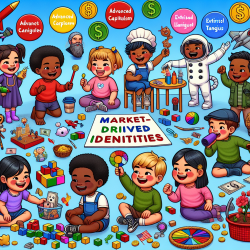Introduction
The socio-ecological evolution of market-driven identities in young people presents a unique challenge and opportunity for speech-language pathologists (SLPs) working with children. The research article, "The Development of Market-Driven Identities in Young People: A Socio-Ecological Evolutionary Approach," provides valuable insights into how advanced capitalist cultures shape the identities of young people, emphasizing extrinsic values such as individualism, materialism, and status-seeking. Understanding these dynamics can help practitioners tailor their therapeutic approaches to foster more balanced identity development in children.
Understanding Market-Driven Identities
Advanced capitalism has led to the rise of market-driven identities, where young people are increasingly influenced by extrinsic values. These values are often embodied in societal markers such as physical attractiveness, material success, and high achievements. The research highlights the potential mental health risks associated with an overemphasis on extrinsic values, including increased risk for personal maladjustment and poorer well-being.
For SLPs, recognizing these influences is crucial in addressing the holistic development of children. By acknowledging the pressures of market-driven identities, practitioners can better understand the challenges children face in balancing intrinsic and extrinsic values.
Implementing Research Outcomes in Therapy
SLPs can utilize the findings from this research to enhance their therapeutic strategies. Here are some actionable steps:
- Promote Intrinsic Values: Encourage activities that focus on intrinsic values such as creativity, empathy, and personal growth. This can help counterbalance the societal emphasis on extrinsic achievements.
- Foster Self-Awareness: Help children develop a strong sense of self-awareness and self-worth that is not solely tied to external validation. This can be achieved through reflective exercises and discussions.
- Integrate Cultural Contexts: Tailor therapy sessions to incorporate cultural and societal contexts that the child is exposed to. This can help children navigate their identities within their socio-cultural environments.
- Collaborate with Families: Work closely with families to create supportive environments that emphasize both intrinsic and extrinsic values. This collaboration can provide a consistent message across different settings.
Encouraging Further Research
While the current research provides a foundational understanding, further studies are needed to explore the long-term impacts of market-driven identities on children's development. SLPs are encouraged to engage in research that examines how these identities influence communication skills and social interactions.
By contributing to the body of research, practitioners can help develop evidence-based strategies that support the balanced development of children's identities in a rapidly evolving cultural landscape.
Conclusion
The insights from "The Development of Market-Driven Identities in Young People: A Socio-Ecological Evolutionary Approach" offer valuable guidance for SLPs seeking to improve therapy outcomes for children. By understanding and addressing the influence of market-driven identities, practitioners can foster environments that support healthy identity development and communication skills.
To read the original research paper, please follow this link: The Development of Market-Driven Identities in Young People: A Socio-Ecological Evolutionary Approach.










